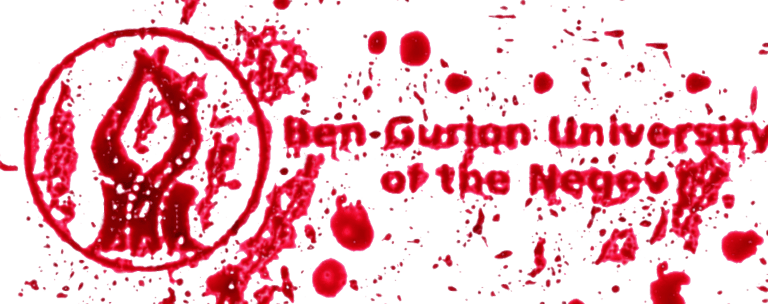

URGENT CALL FOR TU BERLIN TO UPHOLD ITS ETHICAL RESPONSIBILITY

HOME ● MAIN DEMAND ● SUPPORTERS ● EVIDENCE

Tel Aviv University's official motto in English is 'Pursuing the Unknown,' yet its Ramat Aviv campus sits atop the razed ruins of the Palestinian village of Sheikh Munis — a village once known to its inhabitants, still known to their descendants, but seemingly beyond the university's pursuit.


Ties to Israeli Military, Defense Ministry and the ongoing violations of Human Rights
Tel Aviv University’s venture capital firm, TAU Ventures, boasts of investing in Xtend [LinkedIn], which provides systems to deploy armed drones that have been used in Israel’s current potential war crimes [afsc].
“Four days after October 7th, the IDF chose Xtend as one of their core partners in the war against Hamas. Since then, their team has put its former activities on hold and redirected energies to supporting the IDF 100%” [CTech].
"We've received more orders in the past two months than the rest of the entire 2022 year combined. What used to be manufacturing 10 to 50 systems in a month has become 300 to 500 in a month” [CTech].
“Tel Aviv startup Xtend, a developer of a human-guided AI drone and robots operating system that was tested and deployed by the Israeli army in a dense urban battlefield during the ongoing war with the Hamas terror group in the Gaza Strip, has raised $40 million in fresh capital in a private funding round” [TTI1].
“Xtend will use the funds to further develop AI operating system that allows humans to manage teams of drones and robots for defense and civilian purposes” [TTI1].
Tel Aviv University cooperates with Elbit Systems in multiple fields including of autonomous drone navigation and nanoscience [TAU1,TAU2]. Elbit Systems is one of the primary suppliers of weapons and surveillance systems to the Israeli military and has been actively contributing to the ongoing suffering of the Palestinian population:
“Elbit-made MPR 500 multi-purpose bombs are being used by Israel in its attacks on the Gaza Strip. Designed for use in 'densely populated urban warfare,' these bombs contain 26,000 controlled fragments for 'high kill probability.' Elbit says that these 500-pound bombs are as powerful as U.S.-made 2,000-pound MK-84 bombs” [afsc].
Research and academic activities with ties to the current violations of Palestinian human rights
The Institute for National Security Studies (INSS)
The Institute for National Security Studies (INSS) is affiliated with the Tel Aviv University. This affiliation provides the INSS with access to academic resources, research collaborations, and intellectual contributions from the university’s faculty and students.
The INSS has been extensively reporting on the events following the October 7, 2023, attacks, focusing primarily on strategic and military analyses. However, their coverage notably omits crucial aspects such as the deaths of humanitarian aid workers and international journalists, the incident of the Israeli military accidentally killing its own hostages, and the severe humanitarian impact of the war on Gaza. This selective reporting by the INSS represents a dangerous case of information omission, which actively contributes to the violation of human rights and international law. By neglecting these critical issues, the INSS's publications fail to acknowledge the full humanitarian crisis and the implications of these actions, thereby indirectly supporting narratives that justify ongoing violations and undermine efforts to address the broader humanitarian concerns and legal obligations under international law. This omission aligns with a pattern of avoiding uncomfortable truths that challenge the official narrative and hinders comprehensive understanding and accountability in the conflict [INSS1].
The INSS is credited with developing the Dahiya Doctrine, also known as the doctrine of disproportionate force. This doctrine, adopted by the Israeli military, advocates for the destruction of national infrastructure and the infliction of intense suffering on the civilian population.
In a Publication made on October 2, 2008, still in the INSS website to this day, Gabi Siboni calls for the use of a “force that is disproportionate to the enemy's actions and the threat it poses.”
Here are some excerpts from the paper:
“Such a response aims at inflicting damage and meting out punishment to an extent that will demand long and expensive reconstruction processes.”
"The strike must be carried out as quickly as possible and must prioritize damaging assets over seeking out each and every launcher.”
“in Lebanon, attacks should both aim at Hizbollah’s military capabilities and should target economic interests and the centers of civilian power that support the organization” [INSS2].
And as the university overlooks the ruins of its past, it actively partakes in shaping the ruins of the present in Gaza. Through its technological contributions to the massacres and by weaving narratives that justify rather than examine these crimes, it strays ever further from its proclaimed pursuit.
The Tel Aviv University has instituted a propaganda course on Israel’s current genocide on Gaza:
“The new academic course follows another initiative of the Lowy International School: a task force initiated by international students to assist Israel's national effort to tell the war's true and tragic story to the world” [TAU3].
The Tel Aviv University has instituted a task force of international students that help sharing misinformation to further the confusion over the facts of the genocide in social media as well as denying the apartheid system in Israel called out by multiple NGOs both in and outside Israel:
“The ICC decision is the epitome of absurdity” [ig1].
“When people say #israel is an apartheid state they truly have no idea what they are talking about” [ig2].
Support for students or soldiers who participated or are participating in Operation Swords of Iron
Tel Aviv University funded “care packages” for soldiers involved in the ongoing human rights violation and possible war crimes in Gaza [TAU4].
Tel Aviv University has actively supported its students who have been called up for reserve duty in the Israeli military during Operation Swords of Iron. The university announced that each of the estimated 5,239 students serving in the reserves would receive a grant of NIS 1,000 ($250) as an initial measure to help ease their financial burden. This support extends beyond financial aid, as the university also provides academic adjustments to accommodate the students' military commitments and ensures that those serving in combat or combat-support units receive substantial additional grants [TAU5].
Discrimination against Palestinian students after 7 Oct 2023
In an interview made with a member of the Hadash party in Israel and a representative of the Hadash student group at Tel Aviv University, the following testimony was given:
“At the beginning of the war, a lot of Palestinian students who posted on Instagram and Facebook against the war or in support of the people in Gaza were expelled from the university , and some of them were even sent to prison” [TSSP].
Reports from The Legal Center for Arab Minority Rights in Israel (ADALAH) indicate that the university has restricted activities organized by Palestinian student groups. For instance, the university prevented events such as an Arab Book Fair and an artistic protest by Palestinian student movements, citing security and incitement concerns. These actions have been seen as a violation of the students' rights to freedom of expression and organization within the academic setting [Adalah1].
The presence and activities of Israeli military soldiers on campus have also raised concerns among Palestinian students. The university's collaboration with the military to host a program for officer training has been criticized for potentially increasing political tensions and militarization on campus. Palestinian students have expressed fears that the visibility of uniformed soldiers and the emphasis on military studies could exacerbate feelings of insecurity and discrimination [+972MAG(1)].



Discrimination against Palestinian students after 7 Oct 2023
Research and academic activities with ties to the current violations of Palestinian human rights
Technion, a key player in Israel's military-industrial complex, develops advanced military technologies like drones and cyber warfare tools. These technologies are "field-tested" on Palestinian populations in the occupied territories, using these areas as testing grounds. Once proven in conflict, the "combat-tested" weapons are exported globally, often to regimes known for human rights abuses, making Technion a central contributor to violence both within Israel's occupation and abroad.
Education and research at the Technion are focused on the development of hi-tech weaponry, serving as an incubator for the Israeli military-industrial complex, and developing technologies like:
The remote-controlled Caterpillar D-9 bulldozer: The Technion has developed remote-control capabilities for the Caterpillar D-9 bulldozer to facilitate the continued destruction of Palestinian houses, olive groves, and tunnels without any risk to their operators. According to one military officer, the Israeli military doubled its order for D-9s after they “performed remarkably during operation Cast Lead [the invasion of Gaza]” [JP] . A UN-appointed fact finding mission later reported strong evidence of war crimes committed during that operation including with the D-9 Bulldozer [OHCHR].
The Caterpillar D-9 bulldozer has also been actively used by the Israel Defense Forces (IDF) in operations following the October 7, 2023 attacks. The Israeli military employed these heavily armored bulldozers, often referred to as "Teddy Bears," for various purposes, including clearing pathways, demolishing structures, and fortifying defensive positions along the Gaza borderThe stealth drone: As part of the Technion Autonomous Systems Program (TASP), students at The Technion developed the “Stealth drone” which can fly up to 1850 miles and carry two 1100-pound “smart bombs.” TASP also developed the “Dragonfly” drone whose 9-inch wing span makes it small enough to “easily enter rooms through small windows and to send back photos from a miniature camera” according to the American Technion Society’s website [ATS].
The Scream: Electro-Optics Research & Development (EORD), a subsidiary of the university, manufactured the “Scream,” an acoustic system that “creates sound levels that are unbearable to humans at distances up to 100 meters” [WP].
Support for students or soldiers who participated or are participating in Operation Swords of Iron
The Technion provides a grant of 6,000 NIS to all students mobilized by an emergency call-up order. This grant is intended to cover tuition fees, dormitory rent, and other related expenses for student soldiers that may be involved in alleged war crimes and a plausible genocide currently investigated by the ICJ.[Tech2]
Ties to Israeli Military, Defense Ministry and the ongoing violations of Human Rights
The Technion - Israel Institute of Technology is closely tied to the Israeli military-industrial complex, contributing to the oppression of Palestinians through its collaborations and research. The university works with major arms manufacturers like Elbit Systems which is targeted for divestment around the world due to its involvement in "violations of international humanitarian law"[Haaretz1] as well as the Israeli-government owned Rafael Advanced Defense Systems and Israeli Aerospace Industries. The university contributed heavily to developing military technologies used in the Gaza Strip and the West Bank. It also has high level of support to the Israeli military:
Technion during 2008–2013 had a research partnership with Elbit Systems Ltd., which provides electronic detection devices used in the Israeli Separation Wall in the West Bank, and has also supplied drones to the Israeli army for use in combat in the West Bank and Gaza [RBR]
In 2008 Technion opened a center for developing electro-optics in partnership with Elbit systems, one of the largest Israeli weapons companies[ והטכניון מערכות אלביט [(org.archive (הקימו מרכז מחקר בתחום מערכות הראייה – הידען]
Elbit Systems gave half a million dollars to the Technion in research grants [ הדפס [(org.archive (כתבה אלביט מערכות תעניק מענקי מחקר לטכניון בהיקף של חצי מיליון דולר]
Rafael Advanced Defense Systems Ltd. has maintained a research and project-based relationship with Technion[Tech]. It is a large Israeli state-owned weapons manufacturer, Rafael Advanced Defense Systems makes missiles, drones, and other weapons systems for the Israeli military that has been involved in the current war. “The Israeli military has used Rafael Spike Guided Missiles extensively to target, from the air and ground, people inside buildings in the Gaza Strip. The Spike missile family includes many configurations, including ground missiles for use by infantry soldiers and air-to-ground missiles that can be mounted on aircraft and drones.”[afsc] “Rafael collaborated with the Israeli military to develop the Spark, a new unmanned drone used to carry out intelligence missions, escort ground forces, and direct strikes. After first being received by the Israeli Air Force in September, Spark drones have reportedly been assisting Israeli combat teams in Gaza and acting as a "force multiplier on the battlefield."[afsc]
Prof. Uri Sivan, President of the Technion-Israel Institute of Technology said that at Technion “students, administrative personnel, and academic staff rally to aid Israeli military soldiers”
The Technion is a sponsor of the Psagot “academic reserve” program[PAA]
Technion organizes courses focused on how to brand and market Israel’s defense industry to global audiences[+972(2)]
Technion has close links with Verint, Check Point, and NICE systems. NICE systems, Check Point, and Comverse, a Verint acquisition, are three of Israel’s largest high-tech companies. Each is influenced by technology developed by Unit 8200 – Israel’s version of the NSA, which is involved in the surveillance of Palestinian telephone and internet traffic.[NYACT]
TU Berlin’s potential direct participation in the human rights violation happening in Gaza
Since October 7, 2023, the Technion – Israel Institute of Technology has displayed discriminatory practices against Palestinian students by applying its disciplinary jurisdiction inconsistently. While the university claimed it could not
In 2022/2023 a Computer Engineering TU Berlin Student participated in an exchange semester at where he states he had taken the following courses: Algorithms and Applications in Computer Vision – 046746 which involves research that could very well be for ‘dual-use’
The TU Berlin should investigate the research agreements and funds as well as Technion’s involvement in military research or weapons that have been contributing to the current violation of international human rights.
TU Berlin should also investigate the specific department which has research partnerships with the above stated weapons manufacturers to ensure that TU Berlin’s resources and exchange students are not utilized for research that could lead to grave breaches of international human rights and laws.
discipline a Jewish-Israeli student for online threats, it has actively punished Palestinian students for social media posts unrelated to the Technion. This double standard underscores a broader pattern of biased enforcement, disproportionately targeting Palestinian students and creating a hostile academic environment[adalah2].



Unit 8200
Research and academic activities with ties to the current violations of Palestinian human rights
The Ben-Gurion University hosts the Homeland Security Institute which partners with Elbit System and Rafael Advanced Defense Systems as well as the Israel Aerospace Industries (IAI), the ministry of defense [BGU1], all of which are participating in the current human rights’ violation and the plausible genocide:
Ben-Gurion University’s technology transfer company BGN Technologies “conducts research for companies wishing to take advantage of [Ben-Gurion University]’s expertise and facilities”[BGU2] [DUB]
In 2019, Ben-Gurion University and Rafael signed a multi-year research collaboration after the company decided to open an R&D center at the university’s Advanced Technologies Park.[BGU3][TTI2]
“In addition, an elite Israel Defense Forces (IDF) technology unit recently relocated to Beer-Sheva. The sprawling new IDF campus is located adjacent to the University, reinforcing the important and long-standing partnership between BGU and the IDF to safeguard Israel’s future. The new IDF campus houses technological units, Israeli Air Force units, and the headquarters of the military’s Southern Command, responsible for dealing with threats from Gaza.” [ISSUU]
When Elbit Systems opened a new lab at the Advanced Technologies Park in March 2024, the company stated that it maintained “a close relationship with academia [that] extends beyond simple collaboration. We actively transform academic research into practical applications…Students involved in our projects earn academic credit for their work, creating a mutually advantageous connection”. [ES] [DUB]
“Additionally, in partnership with the Intelligence Division and the 8200 Alumni Association, we launched the iMTech Training Center to meet the employment demands of high-tech industries in the Negev. The first cohort of young people from the region began this training and placement program in February 2024.”[ISSU]
Support for students or soldiers who participated or are participating in Operation Swords of Iron
Students called up for reserve duty, that may potentially be involved in alleged war crimes and a plausible genocide currently investigated by the ICJ, receive a grant of NIS 1,200 ($300) and can postpone their rental fees if they are living in university housing [TTI3]
TU Berlin’s potential direct participation in the human rights violation happening in Gaza
In the academic year 2019/2020, a Computer Science (B.Sc.) student from TU Berlin participated in an exchange semester at Ben-Gurion University, specifically within the Department of Computer Science, which is a research partner of Unit 8200 responsible for the "Lavender" AI and for war crimes and violation of human rights. [ISSU][TG2][TG1]
Allowing further exchange opportunities between TU Berlin and Ben-Gurion University poses the risk of TU students engaging in research linked to significant human rights and international law violations.
Further cooperation with Ben-Gurion University raises concerns about ensuring that TU Berlin’s resources are not utilized for research that could lead to grave breaches of international human rights and laws.
“All six (intelligence officers, all who have been involved in using AI systems to identify Hamas and Palestinian Islamic Jihad (PIJ) targets in the war) said that Lavender had played a central role in the war, processing masses of data to rapidly identify potential “junior” operatives to target. Four of the sources said that, at one stage early in the war, Lavender listed as many as 37,000 Palestinian men who had been linked by the AI system to Hamas or PIJ.” [TG1]
“Several of the sources described how, for certain categories of targets, the IDF applied pre-authorised allowances for the estimated number of civilians who could be killed before a strike was authorised. Two sources said that during the early weeks of the war they were permitted to kill 15 or 20 civilians during airstrikes on low ranking militants. Attacks on such targets were typically carried out using unguided munitions known as “dumb bombs”, the sources said, destroying entire homes and killing all their occupants.”[TG1]
An investigation by +972 and Local Call revealed that, during the early stages of its most recent war on Gaza, the Israeli military “almost completely relied on Lavender, which clocked as many as 37,000 Palestinians as suspected militants – and their homes – for possible air strikes”. [+972(3)] [DUB]
According to posts on the Israeli military's website, the Gospel was developed by Israel's signals intelligence branch, known as Unit 8200, which is a partner of the Ben Gurion University [NPR]:
Misztal's group (a group that facilitates military cooperation between Israel and the United States) documented one of the first trials of the Gospel and noted that, while the AI had plenty of training data for what constituted a target, it lacked data on things that human analysts had decided were not targets. The Israeli military hadn't collected the target data its analysts had discarded, and as a result the system's training had been biased [NPR]
The Israeli military noted in November 2024 that in addition to increasing accuracy, the Gospel system “allows the use of automatic tools to produce targets at a fast pace.” That same statement said that Israel had hit more than 12,000 targets in the first 27 days of combat [POLITICO]
In 2014 The Guardian published Testimonies from people who worked in this Unit that was and still is partnered with BGU University [ISSU]
“I also collected information on people who were completely innocent […]. All Palestinians are exposed to non-stop monitoring without any legal protection.[…] The notion of rights for Palestinians does not exist at all. Not even as an idea to be disregarded.” [TG2]
"Any Palestinian may be targeted and may suffer from sanctions such as the denial of permits, harassment, extortion, or even direct physical injury.[…] Any information that might enable extortion of an individual is considered relevant information. Whether said individual is of a certain sexual orientation, cheating on his wife, or in need of treatment in Israel or the West Bank – he is a target for blackmail.” [TG2]



The Ariel University
Ariel University started as the "College of Judea and Samaria" and was established by Bar-Ilan University. The institution was founded in 1982 in the Israeli settlement of Ariel [che]
Ariel University is situated in the settlement of Ariel, which is in the West Bank, a territory occupied by Israel since the 1967 Six-Day War. The international community, including the United Nations, generally considers Israeli settlements in the West Bank to be illegal under international law, specifically the Fourth Geneva Convention.
The establishment of institutions like Ariel University in these settlements is thus seen illegal under the fourth Geneva convention and the UN Resolution 2334 [UN1]. That act was done by the Bar-Ilan University and Ariel university was a part of the Bar-Ilan university until 2004 [THE]
“The German Government’s position on the construction of Israeli settlements remains unchanged. They are illegal under international law and jeopardize future mutually agreed negotiations for peace and a life in security and dignity for both Israelis and Palestinians in the region.”[aus-amt]
We are aware that the infringement by the Bar-Ilan University of article 49 of the fourth Geneva convention, UN security council’s Resolution 242 (1967), Resolution 338 (1973), Resolution 446 (1979) and Resolution 2334 (2016) will be regarded as irrelevant by the TU Administration due to the fact that it happened in 1982 to 2004 but settlements are considered a war crime in international law which would make the Bar-Ilan University a potential war criminal institution.
Support for students or soldiers who participated or are participating in Operation Swords of Iron
The university has launched fundraising campaigns and established emergency funds to assist student soldiers that may be involved in the alleged war crimes and plausible genocide currently investigated by the ICJ.[JP2]
The Begin-Sadat Center
The Begin-Sadat Center for Strategic Studies at Bar-Ilan University “Seeks to advance a realistic, conservative and Zionist agenda in the search for security and peace for Israel. Over the years, BESA has been the first to successfully place on the public agenda issues such as the problematic aspects of Palestinian Statehood.” [afbiu]
Efraim Inbar, the center’s former long-term director, has acknowledged that ‘political neutrality’ is not an option for the center, which is Zionist in orientation.
A paper was released in November 2018 by the Begin-Sadat Center for Strategic Studies at Bar-Ilan University by Prof. Hillel Frisch, a professor of political studies and Middle East studies at Bar-Ilan University and a senior research associate at the Begin-Sadat Center for Strategic Studies. The paper states: “Only a fourth massive round of fighting against Hamas can possibly bring the group to the conclusion the Arab states reached after four wars with the Jewish state in 1948, 1956, 1967, and 1973 – that the pain to be suffered is so great, and the chance of eliminating the Jewish state so slim, as to render violence pointless.” [BESA1] and “Now, alas, is the time for war.”[BESA1]
Another paper published by the Begin-Sadat Center for Strategic Studies at Bar-Ilan University written by Lt. Col. (res.) Dr. Mordechai Keda titled “Why Do the Arabs Hate the Palestinians”: “Israel is rich while many Arabs and Muslims are poor; Israel is a paradise compared to some Arab countries, many of which resemble nothing so much as the last train stop before hell (see Syria, Iraq, Libya, Yemen, Sudan; the list goes on). In short, they despise Israel because it has succeeded in areas where they have failed.” [BESA2]
After operation Guardian of the Walls in 2021, one BESA Center paper advocated boycotting Palestinians[BESA3]; another warned against any Israeli withdrawal from the West Bank[BESA4] which is explicitly against international law according to article 49 of the fourth Geneva convention, UN security council’s Resolution 242 (1967), Resolution 338 (1973), Resolution 446 (1979) and Resolution 2334 (2016)..
According to the begin-Sadat Center of the Bar-Ilan University “the demand for a continued Israeli presence in those areas (West Bank) is justified, both tactically and generally” [BESA4]. This perspective practically calls for the continuation of policies that violate international law according to article 49 of the fourth Geneva convention, UN security council’s Resolution 242 (1967), Resolution 338 (1973), Resolution 446 (1979) and Resolution 2334 (2016).



The Ariel University
Ariel University started as the "College of Judea and Samaria" and was established by Bar-Ilan University. The institution was founded in 1982 in the Israeli settlement of Ariel [che]
Ariel University is situated in the settlement of Ariel, which is in the West Bank, a territory occupied by Israel since the 1967 Six-Day War. The international community, including the United Nations, generally considers Israeli settlements in the West Bank to be illegal under international law, specifically the Fourth Geneva Convention.
The establishment of institutions like Ariel University in these settlements is thus seen illegal under the fourth Geneva convention and the UN Resolution 2334 [UN1]. That act was done by the Bar-Ilan University and Ariel university was a part of the Bar-Ilan university until 2004 [THE]
“The German Government’s position on the construction of Israeli settlements remains unchanged. They are illegal under international law and jeopardize future mutually agreed negotiations for peace and a life in security and dignity for both Israelis and Palestinians in the region.”[aus-amt]
We are aware that the infringement by the Bar-Ilan University of article 49 of the fourth Geneva convention, UN security council’s Resolution 242 (1967), Resolution 338 (1973), Resolution 446 (1979) and Resolution 2334 (2016) will be regarded as irrelevant by the TU Administration due to the fact that it happened in 1982 to 2004 but settlements are considered a war crime in international law which would make the Bar-Ilan University a potential war criminal institution.
